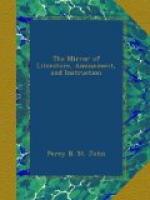But, after all, do we, by employing only foreigners—for we are not particular, so they be foreigners, as to whether they were born and bred beyond, or on this side the Alps,—do we, by employing only foreigners, secure this essential purity of Italian pronunciation? Will these super-delicate critics favour a plain man, by informing me which of the great singers I have heard for the last thirty years I should select as my canon of true Italian pronunciation—Catalani and Camporese, or Garcia the Spaniard and Begrez the Fleming? There is not more difference between the English, whether we look to phraseology or pronunciation, of a Londoner, a Gloucestershire man, or a Northumbrian, than there is between the Italian of a Tuscan, a Venetian and a Neapolitan. Have the stage lamps of Drury Lane or Covent Garden the virtue of curing the Northumbrian’s burr, or correcting the Gloucestershireman’s invincible abhorrence of h’s and w’s? If not, can we expect that even the theatres of Rome and Florence will neutralize at once the provincial accent of a Neapolitan or Venetian? Was it in Morelli, the stable-boy, or Banti, the street ballad-singer, that the beau ideal of pure Italian pronunciation was to be recognised?
But, to be serious. I will venture to affirm that, on this side the Alps, there is no country in Europe whose natives have so little to learn, or to unlearn, in acquiring a good Italian pronunciation, as the English. We have neither the gutturals of the German and the Spaniard, nor the mute vowels and nasal n’s of the French to get rid of; there is scarcely a sound in the Italian language which we are not in the daily habit of uttering, and nearly our whole task would be confined to the learning that certain conventional alphabetical symbols, which represent one sound in English, represent another in Italian. Away, then, with the jargonal pretence that English singers cannot acquire a good and pure Italian pronunciation; make it worth their while, open the stage-doors of the King’s Theatre to the native artist, and you will soon find talent more than enough.
* * * * *
THE COSMOPOLITE.
* * * * *
COINCIDENT POPULAR SUPERSTITIONS.
(Continued from page 284.)
[Transcriber’s note: see Mirror 486]
Such is the tale, which is either of itself the fragment of some popular superstition, or has given rise to many coincident legends. “I am sure,” says the kind friend who furnished us with the narrative, speaking of the Beresford from whom she received it, “that neither he, nor any of his relations, disbelieves the statements recorded.” Possibly not; nor dare we profess to be utterly sceptical—simply as Christians—to all narratives of this description; but, allowing the possibility, nay, the necessity in some cases, of supernatural agency, still,




